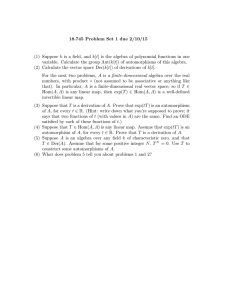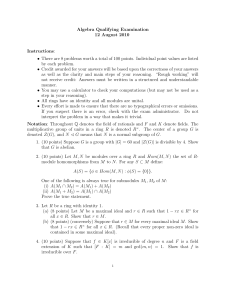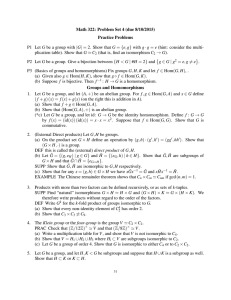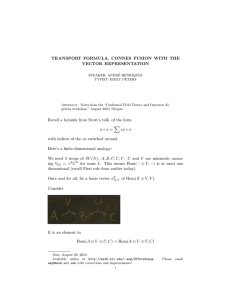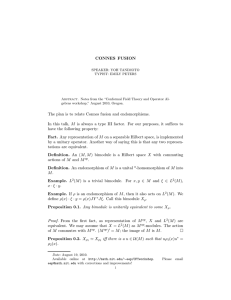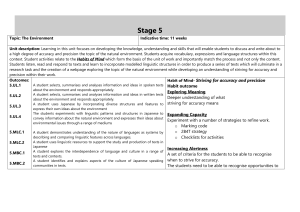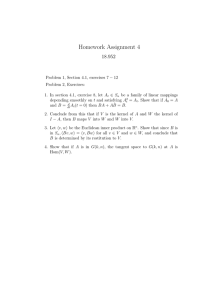Math 223: Problem Set 6 (due 17/10/12)
advertisement
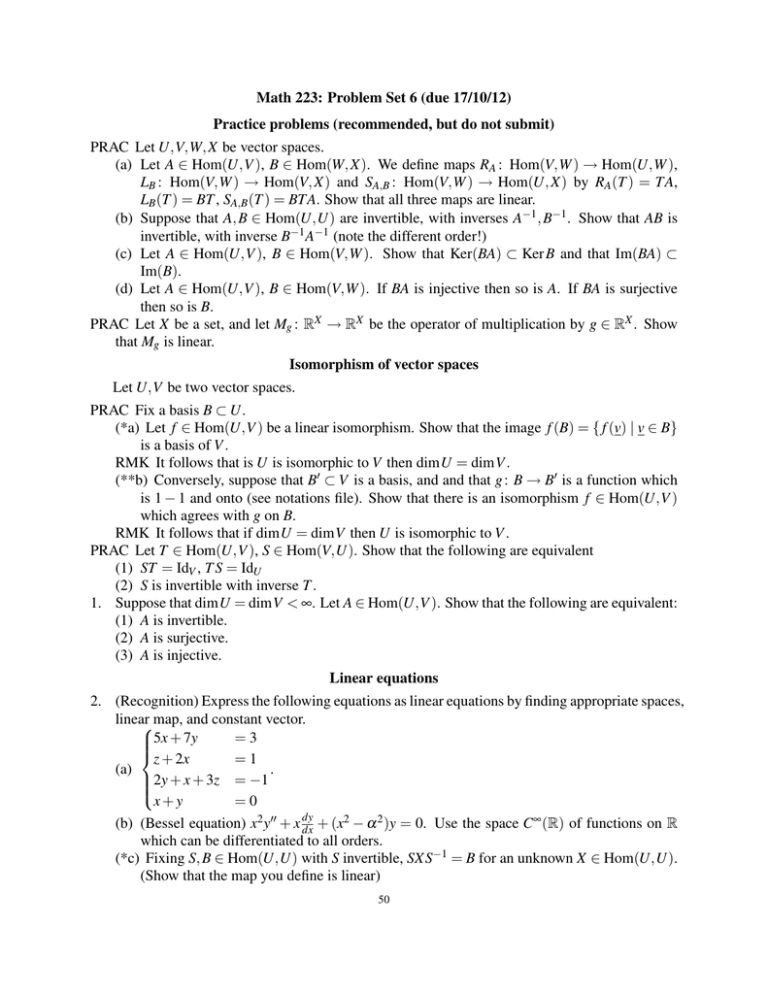
Math 223: Problem Set 6 (due 17/10/12)
Practice problems (recommended, but do not submit)
PRAC Let U,V,W, X be vector spaces.
(a) Let A ∈ Hom(U,V ), B ∈ Hom(W, X). We define maps RA : Hom(V,W ) → Hom(U,W ),
LB : Hom(V,W ) → Hom(V, X) and SA,B : Hom(V,W ) → Hom(U, X) by RA (T ) = TA,
LB (T ) = BT , SA,B (T ) = BTA. Show that all three maps are linear.
(b) Suppose that A, B ∈ Hom(U,U) are invertible, with inverses A−1 , B−1 . Show that AB is
invertible, with inverse B−1 A−1 (note the different order!)
(c) Let A ∈ Hom(U,V ), B ∈ Hom(V,W ). Show that Ker(BA) ⊂ Ker B and that Im(BA) ⊂
Im(B).
(d) Let A ∈ Hom(U,V ), B ∈ Hom(V,W ). If BA is injective then so is A. If BA is surjective
then so is B.
PRAC Let X be a set, and let Mg : RX → RX be the operator of multiplication by g ∈ RX . Show
that Mg is linear.
Isomorphism of vector spaces
Let U,V be two vector spaces.
PRAC Fix a basis B ⊂ U.
(*a) Let f ∈ Hom(U,V ) be a linear isomorphism. Show that the image f (B) = { f (v) | v ∈ B}
is a basis of V .
RMK It follows that is U is isomorphic to V then dimU = dimV .
(**b) Conversely, suppose that B0 ⊂ V is a basis, and and that g : B → B0 is a function which
is 1 − 1 and onto (see notations file). Show that there is an isomorphism f ∈ Hom(U,V )
which agrees with g on B.
RMK It follows that if dimU = dimV then U is isomorphic to V .
PRAC Let T ∈ Hom(U,V ), S ∈ Hom(V,U). Show that the following are equivalent
(1) ST = IdV , T S = IdU
(2) S is invertible with inverse T .
1. Suppose that dimU = dimV < ∞. Let A ∈ Hom(U,V ). Show that the following are equivalent:
(1) A is invertible.
(2) A is surjective.
(3) A is injective.
Linear equations
2. (Recognition) Express the following equations as linear equations by finding appropriate spaces,
linear
map, and constant vector.
5x + 7y
=3
z + 2x
=1
.
(a)
2y + x + 3z = −1
x+y
=0
dy
(b) (Bessel equation) x2 y00 + x dx
+ (x2 − α 2 )y = 0. Use the space C∞ (R) of functions on R
which can be differentiated to all orders.
(*c) Fixing S, B ∈ Hom(U,U) with S invertible, SXS−1 = B for an unknown X ∈ Hom(U,U).
(Show that the map you define is linear)
50
PRAC Suppose that dimU = n. Using a basis for U, replace the equation of (c) with a system
of n2 equations in n2 unknowns.
Let’s learn induction using similarity of matrices.
Let U be a vector space. Write End(U) for Hom(U,U) (linear maps from U to itself).
D EFINITION . Let U be a vector space. We say that two transformations A, B ∈ End(U) are
similar if there is an invertible linear map S ∈ End(U) such that B = SAS−1 .
3. (Calculations)
PRAC Suppose that A, B are similar and A = 0. Show that B = 0.
(a) Suppose that A, B are similarand A = Id
U .
U . Show
that B = Id
−33 15
0 2
are similar via the similarity
,B=
(b) Show that the matrices A =
−63 29
6 −4
1 2
transformation S =
. (For a formula for S−1 see PS5)
3 4
4. (Similarity is an “equivalence relation”)
(a) show that A is similar to A for all A. (Hint: choose S wisely)
(b) Suppose that A is similar to B. Show that B is similar to A (Hint: solve B = SAS−1 for A).
(x) Suppose that A is similar to B, and B is simlar to C. Show that A is similar to C.
For the rest of the problem set fix A, B, S such that B = SAS−1 . Define An as follows: A0 = IdU and
An+1 = An · A.
5. Induction 1
(a) Show that B0 = SA0 S−1
PRAC Show that B2 = SA2 S−1 and B3 = SA3 S−1 .
(b) Suppose that Bn = SAn S−1 . Show that Bn+1 = SAn+1 S−1 .
The principle of mathematical induction says that (a),(b) together show that Bn = SAn S−1
for all n.
PRAC (Induction 2) For a polynomials p(x) = ∑ni=0 ai xi ∈ R[x] and A ∈ End(U) define p(A) =
∑ni=0 ai Ai . We will prove that p(B) = Sp(A)S−1 .
(a) Suppose that p is a constant polynomial. Show that p(B) = Sp(A)S−1 .
(b) Suppose that the formula holds for polynomials of degree at most n. Show that the formula
holds for polynomials of degree at most n + 1 (hint: if p has degree at most n + 1 you can
write it as p(x) = an+1 xn+1 + q(x) where q has degree at most n).
RMK You will need to show that S(aT )S−1 = aST S−1 for any scalar a.
.,
51
